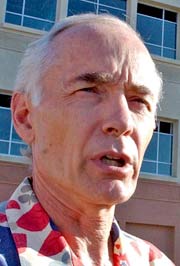UH’s dean
of medicine resigns
A neuro-degenerative
disorder ends an
accomplished tenure
Dr. Edwin Cadman, who has been on leave since February as dean of the John A. Burns School of Medicine, will return to the school Aug. 8 as a professor.
![]()

Dr. Edwin Cadman, who resigned yesterday as dean of the John A. Burns School of Medicine, has been a strong booster for the school as an economic pump for state biotechnology.
Cadman explained his condition in an emotional appearance before the University of Hawaii Board of Regents. "I cannot talk clearly but I remember everything," Cadman told the regents.
He said he has been blessed the past few months "with the outpouring of support not only by my friends, but by strangers as well. I want to thank them all for their cards, letters, e-mails and prayers. I want to especially thank the students, faculty and staff of the medical school who were so kind to me."
Cadman's disorder, previously undisclosed, is a form of dementia that interferes with verbal expression and language comprehension. People do not lose their memory with aphasia as they do with Alzheimer's, the more common form of dementia, but they have language dysfunction, said Dr. Cherylee Chang, neurologist and medical director of the Queen's Medical Center's Neuroscience Institute. There is no effective treatment.
Chang said aphasia was thought to be rare, but it is being recognized more often. She said no one in the Queen's institute has diagnosed a case, but hundreds of patients are being described in medical literature.
An article on primary progressive aphasia in the New England Journal of Medicine in 2003 said, "Although the language disorder in primary progressive aphasia may interfere with the patient's ability to memorize word lists or solve reasoning tasks, the patient typically has no difficulty in recalling daily events or behaving with sound judgment, indicating that explicit memory, reasoning and social skills remain relatively intact."
The most common sign of primary progressive aphasia is the inability to find the right word in conversation or to name objects requested, according to the article by Harvard neurologist Marsel Mesulam.
He suggested some types of intervention to aid with impaired daily activities.
Patients can learn sign language, carry laminated cards to provide information to help themselves or others, or use voice synthesizers or personal computers that digitally store words and phrases, he said.
Cadman was hired to lead the UH medical school when two faculty committees said it was a drain on the institution's budget and should be closed.
He previously was senior vice president of medical affairs for Yale-New Haven Hospital and Yale-New Haven Health System and chief of staff at Yale-New Haven Hospital.
Cadman rejected the first offer of the dean's position here, then surprisingly changed his mind.
He said after arrival he wanted to be the June Jones of medicine, bringing the same popularity and resources to the medical school that the UH football coach did for athletics.
He attracted top-caliber faculty and funding for the school, spearheaded development of a $150 million medical school at Kakaako and obtained full accreditation for the school through 2008-09.
Looking at the new school a year ago, he said: "That's reality. I didn't expect this to happen."
The facility's education building began holding classes in April. The research building is due for completion in September.
Cadman has been the strongest booster for the medical school as an economic pump for state biotechnology.
He showcased Hawaii's biotech developments at mainland forums and hosted a Hawaii Bioscience Conference at the Hawai'i Convention Center in January.
Several Nobel laureates were among the distinguished speakers and guests in the bioscience field.
Cadman said yesterday that the regents and UH leaders "took the courage to believe in my dreams, and the new medical school would not have happened without their support and timely decisions."
UH interim President David McClain credited Cadman's "tireless efforts" for creation of the new medical school, saying, "Its completion will serve as a testament to his dedication to the school and to Hawaii. He leaves with the medical school on a steady track for continued success."
McClain said Dr. T. Samuel Shomaker, associate dean of academic affairs, will continue as interim dean of the medical school. A search committee will be formed to search for a successor for Cadman, he said.
E-mail to City Desk
[News] [Business] [Features] [Sports] [Editorial] [Do It Electric!]
[Classified Ads] [Search] [Subscribe] [Info] [Letter to Editor]
[Feedback]
